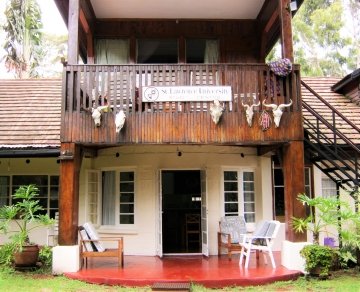St. Lawrence University’s study abroad program in Nairobi, Kenya, is owned and operated by the university. This gives the administration an advantage of full control when sending students there during the pandemic.
“I think I’m getting as much out of it as I wanted to,” said Aubrey Ahern ‘23, who is studying abroad in Nairobi this semester. The campus in Nairobi had been under curfew but has now gone mostly back to normal. “I went into it understanding that everything wouldn’t be the same, and I don’t want an experience that is just like someone else’s,” said Ahern.
Ahern notes that the fall students are the “guinea pigs” for abroad programs in a post-pandemic world. “We are the first group to be going abroad again since COVID,” Ahern said. “Even though there are fewer people vaccinated here, I feel better because people are more conscious about it,” she continued. Ahern explained that the Kenya program has recently been more proactive in implementing an isolation space for students exposed. “There’s an actual space for students to go if they need to isolate. They’re not just trapped in their bedroom,” Ahern said.
“The one benefit that we have is that we own and operate our own campus in Kenya,” said the on-campus coordinator of the Kenya program Professor Matthew Carotenuto. “We have the ability to create a safe bubble for students, and that also includes some additional isolation spaces.”
The pandemic has influenced the number of students who are choosing to study abroad, how these programs are run as well as how students and faculty tackle challenges due to COVID-19. “I think for students, it’s been a challenging time with study abroad during the pandemic in particular. A lot of students have had their plans disrupted, but it’s also a really important time to see those global perspectives and how different parts of the world are dealing with the same things that we’re dealing with,” Carotenuto said.
“When students come back from an off-campus study, whether it’s Kenya or London or anywhere else, they’re going to have some great conversations even if they had to go through those restrictions abroad,” Carotenuto said. “Particularly for those students who aren’t going in the spring semester, but are hearing about this, I would still encourage them to really make this a part of their SLU experience,” Carotenuto said.
The Student Safe Travel Committee (SSTC) has been meeting consistently to discuss abroad operations for all off-campus programs. “The SSTC is currently one of the most important committees that we have here at St. Lawrence, due to the situation with the pandemic,” said Associate Dean of International and Intercultural Studies Marina Llorente. “We have been meeting regularly every single Friday for the last two years,” Llorente said.
“The SSTC considers information from Department of State, Overseas Security Advisory Council and Centers for Disease Control and Prevention, risk intelligence from security, insurance, and educational partners, public health infrastructure and geo-political affairs, among others. We evaluate information from different sources and we make recommendations to President Morris and Senior Staff. CIIS also has meetings with our peer institutions in the New York Six,” Llorente said. “We will never send a student to a place that we don’t feel comfortable with because student safety is always our foremost priority in off-campus studies,” Llorente said.
“Kenya has developed one of the strongest COVID-19 safety plans,” explained Llorente, in reference to presidential elections within the country. “It’s the farthest program that we have, so we have been intensively working on safety plans with them over the years since the program started in 1974,” Llorente said.
“I think one of the toughest things is being diligent and making sure that we’re continuing to monitor information as it changes,” said Interim Director of off-campus programs Kimberly Longfellow. “I recognize that, for students, it is tough as the landscape keeps changing,” Longfellow said.
“Even the students that aren’t studying off-campus have had to adapt, change, and be resilient as the COVID landscape here on our campus changes, and we want to assure students that we recognize it’s challenging,” Longfellow said.



